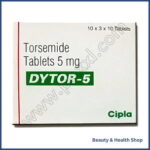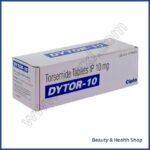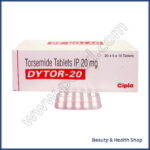ADDICTION
ALCOHOL DEPENDENCE
QUIT SMOKING
ALLERGY
ANTI FUNGAL
FUNGAL INFECTION
FUNGAL NAIL INFECTIONS
ANTI-REJECTION DRUGS
ANTI WORM
ANTIBIOTIC
BACTERIAL INFECTIONS
ARTHRITIS
GOUT
OSTEOARTHRITIS
RHEUMATOID ARTHRITIS
BLOOD
LOW PLATELET COUNT
THROMBOPHLEBITIS
VARICOSE VEINS
COLON
ANAL FISSURE
PILES
ULCERATIVE COLITIS
DIABETES CARE
DIABETES INSIPIDUS
DIABETES TYPE
DIABETIC FOOT ULCERS
GLUCOSE MONITOR
EYES/EAR CARE
DRY EYES
EYE CARE
EYE EXAMINATION
EYE INFECTION
EYE LASHES
EYE PAIN
GLAUCOMA
OCULAR HYPERTENSION
UVEITIS
FEVER CARE
MALARIA
RHEUMATIC FEVER
TYPHOID FEVER
GASTROINTESTINAL
ACIDITY
CONSTIPATION
CROHN'S DISEASE
DIARRHOEA
GALLBLADDER STONES
INTESTINAL ULCERS
IRRITABLE BOWEL SYNDROME
MOTION SICKNESS
NAUSEA
Dytor (Torasemide)
Dytor 5 mg (Torasemide)
Dytor 10 mg (Torasemide)
Dytor 20 mg (Torasemide)
Dytor 40 mg (Torasemide)
Dytor 100 mg (Torasemide)
| Active Ingredient (Generic Name): | Torasemide |
|---|---|
| Indication: | High blood pressure, Oedema |
| Manufacturer | Cipla Limited |
| Packaging: | 15 tablets in one strip, 10 tablets in one strip |
From: $64.00
When it comes to managing conditions like high blood pressure and heart failure, Dytor (Torasemide) plays an essential role in regulating excess fluid in the body. This medication, part of the loop diuretic class, offers relief by increasing urine output. However, there’s more to its uses than just these common conditions. Understanding the broader spectrum of its applications and how it can positively impact various health challenges might surprise you. Stay tuned to uncover the lesser-known aspects of Dytor that could potentially benefit your well-being.
Why is this medication prescribed?
If you have high blood pressure or heart failure, Dytor (Torasemide) is prescribed to help reduce excess fluid in your body. This medication belongs to a class of diuretics known as loop diuretics, which work by increasing the amount of urine produced by your kidneys. By doing so, Dytor helps to decrease the amount of excess water and salt in your body, which can alleviate the symptoms associated with conditions like heart failure and hypertension.
High blood pressure, also known as hypertension, can lead to serious health issues such as heart disease, stroke, and kidney problems. By reducing the fluid volume in your body, Dytor helps to lower blood pressure and decrease the workload on your heart. For individuals with heart failure, the buildup of excess fluid in the body can cause symptoms like shortness of breath, swelling in the legs, and fatigue. Dytor can help alleviate these symptoms by reducing the fluid retention and easing the strain on the heart.
How should this medicine be used?
To properly use Dytor (Torasemide), follow the dosage instructions provided by your healthcare provider for the best results. Typically, this medication is taken by mouth, usually once a day in the morning. It is important to take Dytor exactly as prescribed. You can take it with or without food, but it’s crucial to be consistent with your choice. Swallow the tablet whole with a glass of water; do not crush or chew it. If you miss a dose, take it as soon as you remember, unless it is close to the time for your next dose. In that case, skip the missed dose and continue with your regular dosing schedule. Do not double up on doses to make up for a missed one. It is vital not to suddenly stop taking Dytor without consulting your healthcare provider, as this could lead to adverse effects. If you have any questions or concerns about how to use Dytor, always reach out to your healthcare provider for clarification.
Other uses for this medicine
In addition, Dytor (Torasemide) may also be utilized in treating conditions beyond its primary prescribed use. While primarily prescribed for conditions like congestive heart failure and edema, Dytor can also be beneficial in managing hypertension. By helping the body eliminate excess water and salt through increased urine production, Dytor can aid in reducing blood pressure levels. Moreover, this medication has shown promise in treating ascites, a condition characterized by fluid buildup in the abdomen often seen in liver disease patients. Dytor’s diuretic properties make it effective in reducing the fluid accumulation in the abdomen, providing relief to individuals with ascites. Additionally, some healthcare providers may prescribe Dytor for conditions such as chronic kidney disease to help manage fluid retention and decrease the strain on the kidneys. Always consult your healthcare provider before using Dytor for conditions other than those it is primarily prescribed for, as individual circumstances may vary.
What special precautions should I follow?
When taking Dytor (Torasemide), it is important to check your blood pressure regularly. This medication can affect your blood pressure, so monitoring it is vital for your health. Be sure to follow your healthcare provider’s instructions on how often to check your blood pressure.
Check Your Blood Pressure
Make sure to regularly monitor your blood pressure when taking Dytor (Torasemide) to guarantee it stays within a healthy range. Here are some essential precautions to follow:
- Monitor Your Blood Pressure: Check your blood pressure as advised by your healthcare provider to make certain it remains at a safe level.
- Stay Hydrated: Drink an adequate amount of water unless instructed otherwise by your doctor to prevent dehydration, which can impact your blood pressure.
- Watch for Symptoms: Be alert for signs of low blood pressure such as dizziness, fainting, or weakness, and report any unusual symptoms to your healthcare provider promptly.
What special dietary instructions should I follow?
To maintain a healthy balance of fluids and electrolytes in your body, it is important to adhere to specific dietary guidelines while taking Dytor (Torasemide). First and foremost, it is vital to monitor your salt intake. High-sodium foods like processed snacks, canned soups, and fast food can counteract the effects of Dytor and lead to fluid retention. Instead, opt for fresh fruits and vegetables, lean proteins, and whole grains to help regulate your sodium levels.
Secondly, it is recommended to consume foods rich in potassium. Dytor can sometimes cause potassium levels to drop, so including potassium-rich foods like bananas, oranges, potatoes, and spinach in your diet can help maintain the proper balance.
Lastly, it is essential to monitor your fluid intake. While on Dytor, it is advisable to limit your fluid intake to prevent excess fluid retention. Be mindful of your thirst cues and consult your healthcare provider for specific recommendations tailored to your individual needs. By following these dietary instructions, you can support the effectiveness of Dytor in managing your condition effectively.
What should I do if I forget a dose?
If you forget a dose of Dytor (Torasemide), take it as soon as you remember. However, if it is almost time for your next dose, skip the missed dose and continue with your regular dosing schedule. Do not take a double dose to make up for a missed one. It’s important to maintain a consistent medication routine to guarantee the effectiveness of Dytor (Torasemide) in managing your condition.
If you frequently forget to take your doses, consider setting up reminders on your phone or using a pill organizer to help you stay on track. Establishing a daily routine for taking your medication can also be beneficial in preventing missed doses. If you continue to struggle with remembering your doses, consult your healthcare provider for further guidance on how to improve medication adherence.
Remember that consistency in taking Dytor (Torasemide) is essential for its efficient functioning in managing your condition effectively. By being diligent with your medication schedule, you can better control your health outcomes.
What side effects can this medication cause?
When taking Dytor (Torasemide), it’s important to monitor for any persistent symptoms. Some side effects of this medication can be serious, so if you experience any concerning symptoms, be sure to contact your doctor immediately. Your health and well-being are a top priority, and staying alert to any potential side effects is vital for effective treatment.
Monitor for Persistent Symptoms
Vigilance is crucial when taking Dytor (Torasemide) to promptly recognize and address any potential side effects that may arise. Here are some common side effects to monitor for:
- Dehydration: Watch for increased thirst, dry mouth, and dark urine, as these could indicate dehydration.
- Electrolyte Imbalance: Pay attention to muscle weakness, irregular heartbeat, or tingling sensations, which may signal an electrolyte imbalance.
- Dizziness or Lightheadedness: Be cautious when standing up quickly to avoid feeling dizzy or lightheaded, as this could be a side effect of Dytor.
Monitoring these symptoms closely can help you manage any side effects effectively and safeguard your well-being while on this medication.
Some side effects can be serious. If you experience any of the following symptoms, call your doctor immediately:
Keep an eye out for these serious side effects while taking Dytor (Torasemide) and contact your doctor immediately if you experience them. Some side effects that can be concerning include:
- Signs of dehydration: such as extreme thirst, dry mouth, or decreased urination.
- Electrolyte imbalance symptoms: like muscle cramps, weakness, irregular heartbeat, or confusion.
- Allergic reactions: indicated by rash, itching, swelling, severe dizziness, or trouble breathing.
If you notice any of these symptoms or other unusual reactions while using Dytor (Torasemide), it is important to seek prompt medical attention. Your doctor can evaluate the severity of the side effects and provide appropriate guidance to safeguard your well-being.
What should I know about the storage and disposal of this medication?
For best results with Dytor (Torasemide), always store it in a cool, dry place away from direct sunlight and moisture. Keep the medication at room temperature between 20-25 degrees Celsius (68-77 degrees Fahrenheit). Avoid storing it in the bathroom or kitchen where humidity levels can be high. Make sure to keep Dytor (Torasemide) out of reach of children and pets to prevent accidental ingestion.
When it comes to disposal, do not flush Dytor (Torasemide) down the toilet or pour it into a drain unless instructed to do so. Instead, consult with your healthcare provider or pharmacist on the proper way to dispose of any unused or expired medication safely. You can also check with your local waste disposal company for guidelines on how to dispose of medications properly. By following these storage and disposal instructions, you can guarantee the effectiveness of Dytor (Torasemide) while also maintaining safety in your home.
In case of an emergency/overdose
In the event of an emergency or overdose involving Dytor (Torasemide), promptly seek medical assistance by contacting poison control or visiting the nearest hospital. It is vital to act quickly in such situations to guarantee appropriate care and management. When seeking help, provide as much information as possible, including the amount of medication taken, the time of ingestion, and any symptoms experienced. This information will assist healthcare providers in determining the best course of action.
If you or someone else has taken more Dytor (Torasemide) than prescribed, do not delay seeking help. Overdosing on this medication can lead to serious complications and requires immediate medical attention. Symptoms of an overdose may include extreme dizziness, confusion, severe weakness, or difficulty breathing. It is important not to ignore these signs and to seek professional medical assistance promptly.
What other information should I know?
If you suspect an allergic reaction while taking Dytor (Torasemide), notify your healthcare provider immediately. Allergic reactions may include rash, itching, swelling, severe dizziness, or trouble breathing. It’s vital to follow your doctor’s instructions carefully when taking Dytor. Make sure to inform your healthcare provider about all the medications, supplements, and herbal products you are currently taking, as they may interact with Dytor and affect its effectiveness. Regular monitoring of your blood pressure, kidney function, and electrolyte levels may be necessary while on this medication. It is important to attend all scheduled appointments and laboratory tests to ensure the drug is working properly and not causing any harmful effects. Avoid consuming excessive amounts of alcohol while on Dytor, as it can worsen certain side effects and decrease the effectiveness of the medication. In case of any new or worsening symptoms, such as increased thirst, confusion, weakness, or irregular heartbeat, seek medical attention promptly.
Brand names
When looking for Torasemide, you may come across it under various brand names. Below is a table listing some common brand names that Torasemide is marketed under in different countries:
| Brand Name | Active Ingredient |
|---|---|
| Dytor | Torasemide |
| Demadex | Torsemide |
| Torasemid | Torasemide |
These brand names may vary depending on your location and the pharmaceutical company producing the medication. Please be mindful that while the active ingredient remains the same (Torasemide), the brand names can differ. When purchasing Torasemide, make sure you are getting it from a reputable source and that you are aware of the specific brand name being used in your region. Familiarizing yourself with the various brand names can help you identify the medication correctly and avoid any confusion when seeking refills or discussing your prescription with healthcare providers.
Purchase Options Available
Encountering different brand names for Torasemide might prompt you to explore the various purchase options available for this medication. When considering buying Torasemide, you have several avenues through which you can obtain this diuretic medication. One common option is purchasing Torasemide at your local pharmacy with a valid prescription from your healthcare provider. Pharmacies often carry both branded and generic versions of Torasemide, providing you with choices based on your preferences and budget.
Another option for obtaining Torasemide is through online pharmacies. Many online platforms offer the convenience of ordering medications from the comfort of your home and having them delivered directly to your doorstep. When purchasing Torasemide online, it is important to ensure the pharmacy is legitimate and operates within the guidelines of safe medication practices.
Additionally, some healthcare facilities or hospitals may offer Torasemide for purchase on-site, especially for patients who require immediate access to the medication. Whichever purchase option you choose, it is essential to follow your healthcare provider’s guidance regarding the dosage and usage of Torasemide for your specific medical condition.
To summarise
Exploring the available purchase options for Torasemide can help you make informed decisions about acquiring this medication. Torasemide, marketed under the brand name Dytor, is a diuretic primarily used to treat conditions such as edema and hypertension. When considering purchasing Torasemide, it is important to consult with your healthcare provider to determine the appropriate dosage and frequency of use. Additionally, you may choose to buy Torasemide from local pharmacies, online pharmacies, or through mail-order services, depending on availability and convenience. It is vital to guarantee the authenticity and quality of the medication by purchasing from reputable sources. Comparing prices among different vendors can also help you find the most cost-effective option. Remember to check for any discounts, insurance coverage, or patient assistance programs that could lower the out-of-pocket costs. By summarizing the available purchase options and considering these factors, you can navigate the process of acquiring Torasemide more effectively.












